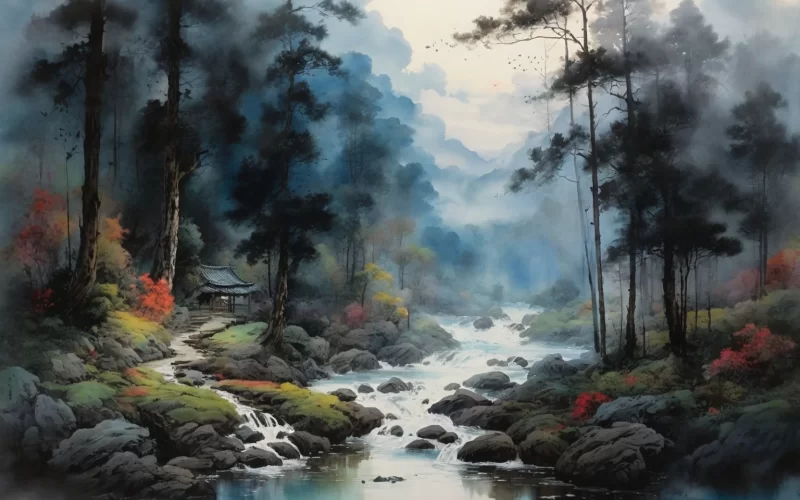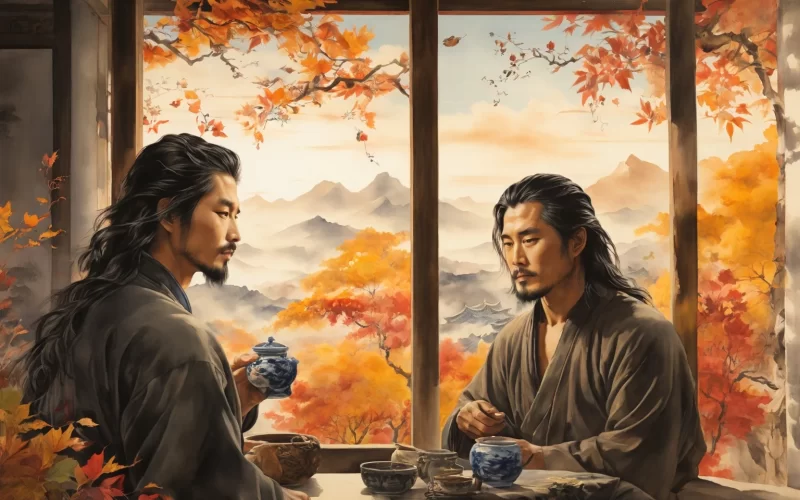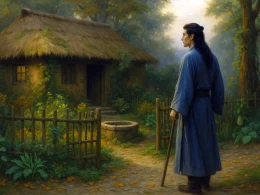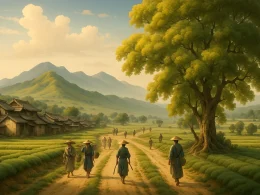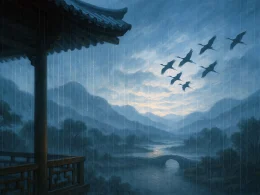From office confinement all year long,
I have come out of town to be free this morning
Where willows harmonize the wind
And green hills lighten the cares of the world.
I lean by a tree and rest myself
Or wander up and down a stream.
…Mists have wet the fragrant meadows;
A spring dove calls from some hidden place.
…With quiet surroundings, the mind is at peace,
But beset with affairs, it grows restless again…
Here I shall finally build me a cabin,
As Tao Qian built one long ago.
Original Poem
「东郊」
韦应物
吏舍跼终年,出郊旷清曙。
杨柳散和风,青山澹吾虑。
依丛适自憩,缘涧还复去。
微雨霭芳原,春鸠鸣何处。
乐幽心屡止,遵事迹犹遽。
终罢斯结庐,慕陶真可庶。
Interpretation
Composed during a relatively tranquil period of Wei Yingwu's official career, this poem captures a morning escape from bureaucratic confines. Weary of long confinement in government offices, the poet ventures into spring countryside at dawn. Through vivid depictions of gentle breezes, distant mountains and birdsong, Wei expresses yearning for reclusive life while confessing his unresolved conflict between duty and desire. The work stands as his spiritual homage to Tao Yuanming's pastoral ideal.
First Couplet: "吏舍跼终年,出郊旷清曙。"
Lì shè jú zhōng nián, chū jiāo kuàng qīng shǔ.
Confined year-round in office walls, I break free— Dawn's clarity unfolds where fields stretch endlessly.
The contrast between "confined" (跼) and "endlessly" (旷) immediately establishes the poem's central tension. The cramped official quarters symbolize worldly constraints, while the expansive dawn landscape represents spiritual liberation.
Second Couplet: "杨柳散和风,青山澹吾虑。"
Yáng liǔ sàn hé fēng, qīng shān dàn wú lǜ.
Willows scatter balmy winds in play, Blue mountains dissolve my cares away.
Nature's therapy manifests through kinetic imagery—willows "scattering" breeze and mountains "dissolving" anxiety. The parallel structure shows external serenity internalized as mental peace.
Third Couplet: "依丛适自憩,缘涧还复去。"
Yī cóng shì zì qì, yuán jiàn hái fù qù.
Resting at will where groves stand deep, Then tracing the brook's recurring sweep.
The poet's wandering rhythm—pausing then proceeding—embodies complete harmony with nature's cadence. The brook's "recurring sweep" mirrors life's cyclical patterns beyond human schedules.
Fourth Couplet: "微雨霭芳原,春鸠鸣何处。"
Wēi yǔ ǎi fāng yuán, chūn jiū míng hé chù.
Light rain veils fragrant plains in haze, Where do spring doves chant their faint phrase?
Reaching poetic sublimity, this couplet creates an ethereal soundscape. The "veiling" rain and unseen doves construct an auditory paradise where location becomes irrelevant—pure sensory bliss.
Fifth Couplet: "乐幽心屡止,遵事迹犹遽。"
Lè yōu xīn lǚ zhǐ, zūn shì jì yóu jù.
Joy in solitude keeps calling clear, Yet duty's haste still chains me here.
The volta sharpens Wei's existential dilemma. Parallel verbs "calling" (止) and "chains" (遽) dramatize the push-pull between his pastoral longing and bureaucratic reality.
Sixth Couplet: "终罢斯结庐,慕陶真可庶。"
Zhōng bà sī jié lú, mù táo zhēn kě shù.
I'll quit to build my thatched retreat— Tao's dream may yet my life complete.
The resolution echoes Tao Yuanming's famous "building a hut among men" (结庐在人境). "May yet" (可庶) injects cautious hope rather than certainty, revealing Wei's honest ambivalence.
Holistic Appreciation
This lyrical masterpiece progresses from physical liberation to spiritual revelation. Wei's morning journey traces an arc from office oppression ("confined") through nature's redemption ("dissolve my cares") to ultimate self-awareness ("Tao's dream"). The spring landscape becomes a liminal space where worldly and ideal selves converse. Particularly striking is how auditory elements (doves' faint phrase) and haptic sensations (balmy winds) create immersive tranquility that visual imagery alone couldn't achieve.
Artistic Merits
The entire poem follows the thread of a "countryside excursion," employing a masterful blend of realistic depiction and lyrical abstraction to fuse captivating spring scenery with the poet's reclusive aspirations. Its language flows with refreshing naturalness, where seemingly plain imagery carries remarkable expressive power within a meticulously balanced structure. Through dynamic verbs like "scatter," "dissolve," "mist," and "warble"—each harmonizing movement and stillness—the poem constructs an aesthetic realm of crystalline serenity, epitomizing the quintessential pastoral style of landscape poetry.
Insights
Wei's 8th-century dilemma mirrors our modern work-life balance struggles. His poem suggests that true freedom begins not with physical escape, but with cultivating moments of presence—whether a dawn breeze or birdsong—amid obligations. The "thatched retreat" ultimately symbolizes an internal sanctuary we can build anywhere. This Tang wisdom reminds us that while complete withdrawal may be impossible, regular communion with nature's rhythms can preserve our humanity in bureaucratic systems.
Poem translator
Kiang Kanghu
About the poet
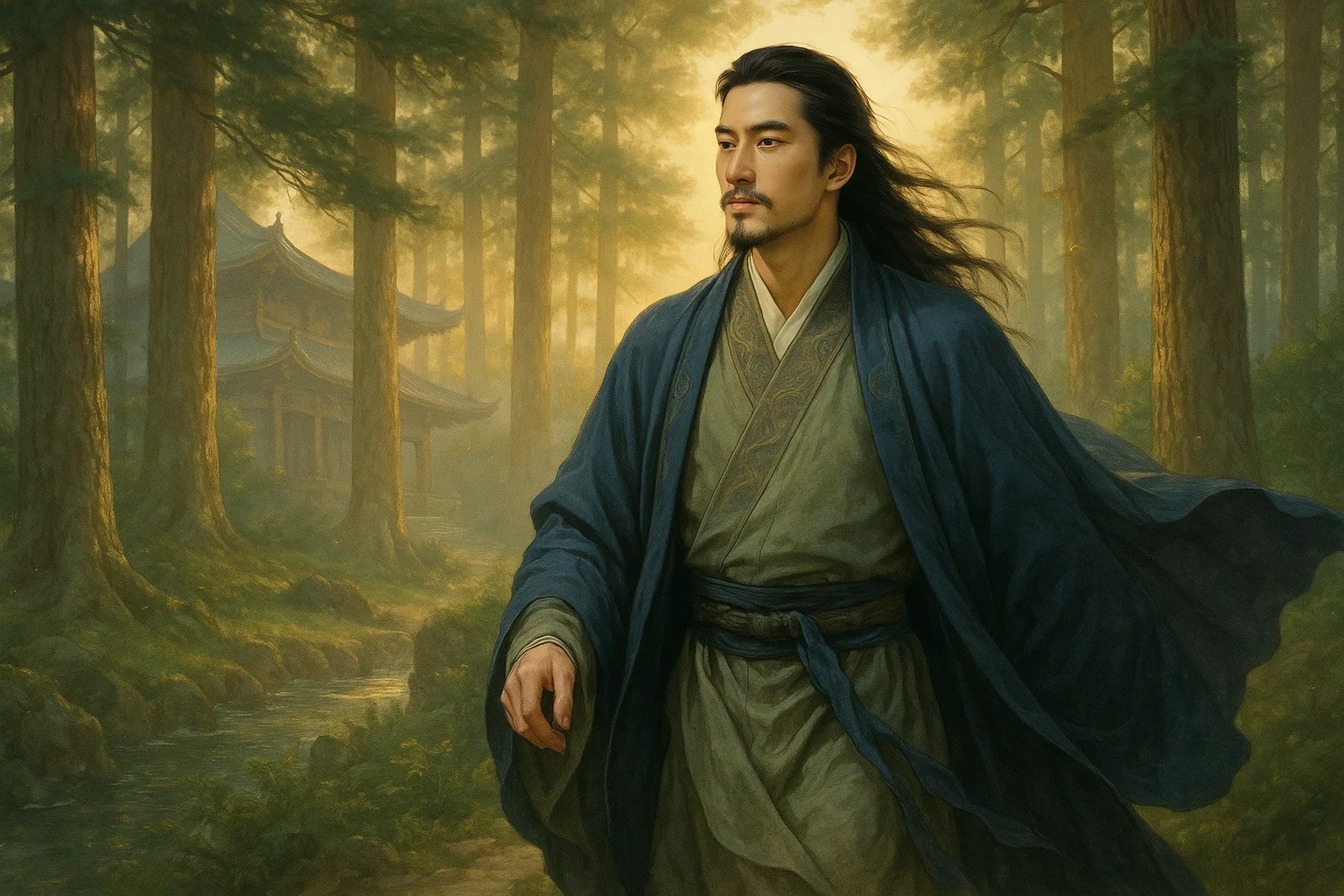
Wei Yingwu (韦应物), circa 737 - 786, was a native of Chang'an, Beijing. His poems were collected in the Wei Suzhou Collection, which included poems concerned with the plight of the people, expressions of disobedience to the times and indignation against the world, and descriptions of idyllic landscapes, etc., of which the ones describing idyllic landscapes are the most famous, and have been sung by posterity in particular.






